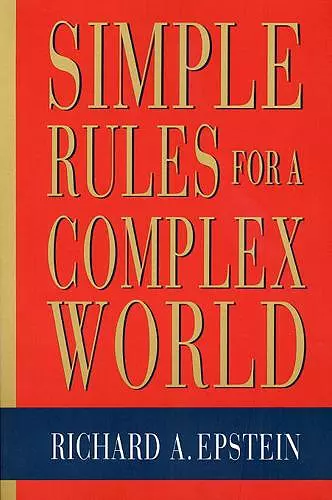Simple Rules for a Complex World
Format:Paperback
Publisher:Harvard University Press
Published:24th Apr '97
Currently unavailable, and unfortunately no date known when it will be back

New York Times Notable Book of 1995
Epstein offers a sophisticated agenda for comprehensive social reform that undoes much of the mischief of the modern regulatory state. At a time when most Americans have come to distrust government at all levels, Epstein shows how a consistent application of economic and political theory allows us to steer between too much and too little.
Too many laws, too many lawyers--that's the necessary consequence of a complex society, or so conventional wisdom has it. Countless pundits insist that any call for legal simplification smacks of nostalgia, sentimentality, or naiveté. But the conventional view, the noted legal scholar Richard Epstein tells us, has it exactly backward. The richer texture of modern society allows for more individual freedom and choice. And it allows us to organize a comprehensive legal order capable of meeting the technological and social challenges of today on the basis of just six core principles. In this book, Epstein demonstrates how.
The first four rules, which regulate human interactions in ordinary social life, concern the autonomy of the individual, property, contract, and tort. Taken together these rules establish and protect consistent entitlements over all resources, both human and natural. These rules are backstopped by two more rules that permit forced exchanges on payment of just compensation when private or public necessity so dictates. Epstein then uses these six building blocks to clarify many intractable problems in the modern legal landscape. His discussion of employment contracts explains the hidden virtues of contracts at will and exposes the crippling weaknesses of laws regarding collective bargaining, unjust dismissal, employer discrimination, and comparable worth. And his analysis shows how laws governing liability for products and professional services, corporate transactions, and environmental protection have generated unnecessary social strife and economic dislocation by violating these basic principles.
Simple Rules for a Complex World offers a sophisticated agenda for comprehensive social reform that undoes much of the mischief of the modern regulatory state. At a time when most Americans have come to distrust and fear government at all levels, Epstein shows how a consistent application of economic and political theory allows us to steer a middle path between too much and too little.
A book called 'The Death of Common Sense: How Law is Suffocating America' by attorney Philip Howard has captured the attention of Washington's policy community with its maddening accounts of overzealous regulation and complex litigation. But Mr. Howard's appeal for enforcing rules with a dose of common sense never sets forth a framework for bringing about legal simplification. That's why Richard Epstein's new book...is such a suitable companion to Mr. Howard's battle cry. Mr. Epstein...believes that the traditional common law is actually more attuned to the modern world...He argues that the more complex the world, the less bureaucrats and lawmakers can know about how everything interacts, and the more perverse and inefficient the law will become...Mr. Epstein's relentlessly logical arguments tell us why we should return to the tried-and-true rules of the common law. Like manners, the common law has proven useful and long lasting precisely because it is so well-suited to a world of strangers. -- John H. Fund * Wall Street Journal *
Richard A. Epstein, a professor of law at the University of Chicago, has a record of proposing radical and extreme alterations in key areas of law--alterations that perhaps initially could be dismissed as so far from the center of legal thinking as to be of only theoretical interest but then turn out to have much more political life in them than one could have thought possible...Mr. Epstein has to be taken seriously, and not only because of the power of his reasoning and his authoritative command of the common law and political philosophy...The reasoning is strong, the knowledge of specific areas of policies is deep, and behind them stands his basic commitment to a more productive and efficient society...It is bracing to undergo a cold bath in the pure doctrine of the simple rules, and in many areas they will give us some practical guidance. -- Nathan Glazer * New York Times Book Review *
Simple Rules for a Complex World is a clear, consistent, libertarian economic approach to the law that should keep you interested from start to finish. -- Charles W. Chesbro * Trial *
This book is a tour de force of legal history and analysis. It would have been timeless in any event, but the current Congress' agenda makes it timely as well. Property rights, product and professional liability, a flat tax and environmental protection are now front and center; labor law reform and comparable worth may soon crowd their way onto the agenda as well. Long-range vision and wisdom are too seldom combined with topical analysis, but Simple Rules for a Complex World has this invaluable quality...What Mr. Epstein has accomplished, then, is not the fabrication of a framework but the distillation of one. He has articulated and rationalized basic principles of law in a creative way that shows these principles to have both historical and theoretical primacy. At a time when much legal scholarship is devoted to the deconstruction of the root of our legal order, Mr. Epstein has written a book of reconstruction. -- Roger Clegg * Washington Times *
A persuasive argument for the American legal system's return to the common-sense rules of common law, by a distinguished professor at the University of Chicago. * Chicago Tribune *
ISBN: 9780674808218
Dimensions: 235mm x 156mm x 25mm
Weight: 544g
378 pages